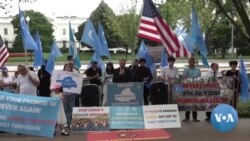Uyghur rights groups protest outside the White House.
Welcome to VOA Asia Weekly. I'm Chris Casquejo in Washington. That story is coming up, but first, making headlines:
China and the Solomon Islands on Monday signed a deal on police cooperation as part of an upgrade of their relations to a "comprehensive strategic partnership". The police cooperation pact was among nine deals signed after Solomon Islands Prime Minister Manasseh Sogavare met with Chinese Premier Li Qiang in Beijing.
U.S. Treasury Secretary Janet Yellen wrapped up a four-day visit to Beijing on Sunday. She discussed issues ranging from trade, the environment, and spying. There appears to have been some progress, but Yellen said the two countries still have a way to go.
South Korean President Yoon Suk Yeol and Japanese Prime Minister Fumio Kishida met on the sidelines of the NATO summit, where they condemned North Korea’s latest missile launch Wednesday. The suspected ICBM flew for 74 minutes, which would be the longest flight time for a North Korean missile.
The chair of the 10-nation Association of Southeast Asian Nations says diplomacy is the only way to resolve the bloody two-and-a-half-year-old crisis in Myanmar. Indonesian Foreign Minister Retno Marsudi made the remarks Wednesday in Jakarta at the start of a second day of talks of ASEAN foreign ministers.
Hundreds of Montagnard Americans marched in Washington on Monday against Vietnam’s stepped-up repression of Montagnards in its Central Highlands. The protesters also urged the U.S. and UN to conduct an independent investigation into the Dak Lak attack that left 9 dead.
Uyghur rights groups in Washington are calling on governments worldwide to stand up to Beijing. They accuse China of genocide and want people to remember what happened 14 years ago in Urumqi, China, during violent confrontations between Uyghurs, Han Chinese and the police. The rights groups say not much has changed. Graham Kanwit reports for VOA.
These Uyghurs in exile accuse China of arbitrarily detaining their loved ones and carrying out other human rights violations in the Uyghur homeland, which they call East Turkistan. Officially the region in northwest China is called Xinjiang.
Outside the White House, these Uyghurs say they want independence from China. They are also commemorating an event they will never forget in the Xinjiang capital, Urumqi, 14 years ago this month.
“Mass killed them, mass shoot them and their bloods stained all of Urumqi city, and all night they washed the blood with the pressure washer in order to hide their crime.”
Urumqi was sparked by violence at a factory in southern China. Six Uyghur men were accused of sexually assaulting two ethnic Han Chinese women, which led to brawling that left two Uyghurs dead. In Urumqi, Uyghurs took to the streets, demanding justice for the killings.
Amanalla Kashgari says the Urumqi protest started peacefully.
“They wanted those criminals to be charged and a proper investigation to be carried out. However, instead of their voices being heard and sit down with the officials, they were brutally cracked down by the paramilitary.”
According to Chinese officials, nearly 200 people died, most of them Han Chinese. But Uyghur activists say that there were many more Uyghur victims, and that China’s repression in their homeland continues to this day. Several countries, including the United States, have described China’s actions as genocide.
In a statement to VOA, Chinese Embassy spokesperson Liu Pengyu describes people who call the Xinjiang region East Turkistan as “separatist forces” that undermine China’s national unity. The statement says, “The issues related to Xinjiang are not about human rights. They are about countering violent terrorism, radicalization and separatism. The accusation of ‘genocide’ in Xinjiang is a flat-out lie of the century.”
The protesters at the White House are calling on the international community to take more action.
Graham Kanwit, for VOA News, Washington.
Finally, South Korea has welcomed its first-ever giant panda twins.
Last Friday at the Everland theme park, mama Ai Bao gave birth to two healthy baby female pandas. The joyous occasion occurred nearly three years after the birth of Fu Bao, the first panda ever born in South Korea.
Visit voanews.com for the most up-to-date stories.
Thanks for watching VOA Asia Weekly. I’m Chris Casquejo. See you next week.











